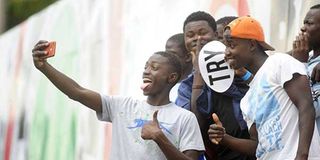Introduce practical lessons to pupils early

Young people taking a selfie. One of the fundamental hindrances to job creation in Kenya is the focus on theoretical courses and the neglect of technical hands-on pragmatic courses. PHOTO | FILE | NATION MEDIA GROUP
What you need to know:
One of the fundamental hindrances to job creation in Kenya is the focus on theoretical courses and the neglect of technical hands-on pragmatic courses.
One of the largest travesties of justice in this country is locking students in the classrooms from early morning to late evening.
In contrast, nations in Southern Africa dismiss all students from the classroom by 3pm and focus on sporting and extra-curricular activities that build the character, perseverance, determination, self-discipline and a strong work-ethic.
Students often wonder why they are in school. They are taken through theoretical drills and the process of memorising words to pass exams. Pupils are indirectly coerced to believe that academia is a lifeline activity and the only guarantee to live a financially free life. Other practical ambitions like sporting and recreational activities are sneered at by teachers, parents and the education system.
FINANCIAL TROUBLE
Money is a mandatory necessity of life. Financial literacy is, therefore, a paramount subject that can be made simpler, effective and exciting, especially during the elementary and primary level. An easy way to implement financial classes that improve accounting and mathematical accuracy is incorporating chess and monopoly board games into the curriculum. Chess sharpens the brain, translates the pupil’s confidence to their daily life and, most of all, instils quick decision making.
The game of monopoly improves financial literacy and accounting skills. When monopoly and accounting basics are taught through elementary and early primary school, accounting subjects can then be introduced in mid-primary and last to the end of high school.
When children are knowledgeable in the basics of accounts and financial literacy, they are unlikely to sink into financial trouble early in their adult life.
One of the fundamental hindrances to job creation in Kenya is the focus on theoretical courses and the neglect of technical hands-on pragmatic courses. We have a huge number of university graduates who cannot make ends meet without seeking employment. Courses like plumbing, carpentry, masonry, electric studies, beauty therapy and mechanics are degraded in higher learning institutions. They are seen as jobs for lower income people who are intellectually challenged.
JOBLESS GRADUATES
Yet, these are the jobs that are largely on demand. Neighbourhoods have numerous jobless graduates, but only one plumber and electrician. All the public higher learning institutions should prioritise the establishment of the culture of practical courses that instantly create employment for the student.
Our education system neglects extra-curricular activities like the arts and sporting talent. One of the best ways to inspire students is to introduce them to inspirational autobiographies that will drive them to achieve great goals.
The grass roots sporting infrastructure and talent development in countries like South Africa, Ghana, Nigeria, Senegal, Mali and Burkina Faso begin in elementary school. They are conducted by competent coaches.
One of the largest travesties of justice in this country is locking students in the classrooms from early morning to late evening. In contrast, nations in Southern Africa dismiss all students from the classroom by 3pm and focus on sporting and extra-curricular activities that build the character, perseverance, determination, self-discipline and a strong work-ethic.
Jeff Anthony is a novelist, Big Brother Africa 2 Kenyan representative, and the founder of Jeff’s Fitness Center. @jeffbigbrother



